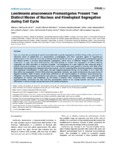Use este identificador para citar ou linkar para este item:
http://www.alice.cnptia.embrapa.br/alice/handle/doc/973494| Título: | Leishmania amazonensis promastigotes present two distinct modes of nucleus and kinetoplast segregation during cell cycle. |
| Autoria: | SILVA, M. S. da  MONTEIRO, J. P.   NUNES, V. S.   VASCONCELOS, E. J.   PEREZ, A. M.   FREITAS JÚNIOR, L. de H.   ELIAS, M. C.   |
| Afiliação: | Marcelo Santos da Silva, Instituto de Biociências, Universidade Estadual Paulista (UNESP) - Botucatu, São Paulo, Brazil JOMAR PATRICIO MONTEIRO, CNPC Vinícius Santana Nunes, UNESP - Botucatu, São Paulo, Brazil Elton José Vasconcelos, Seattle Biomedical Research Institute - Seattle, Washington, United States of America Arina Marina Perez, UNESP - Botucatu, São Paulo, Brazil Lúcio de Holanda Freitas-Júnior, Laboratório Nacional de Biociências (LNBio), Centro Nacional de Pesquisa em Energia e Materiais - Campinas, São Paulo, Brazil Maria Carolina Elias, Center of Toxins, Immune Response and Cell Signaling (CeTICS), Instituto Butantan - São Paulo, SP, Brazil. |
| Ano de publicação: | 2013 |
| Referência: | PLoS ONE, San Francisco, v. 8, n. 11, e81397, Nov. 2013. |
| Conteúdo: | Abstract: Here, we show the morphological events associated with organelle segregation and their timing in the cell cycle of a reference strain of Leishmania (L.) amazonensis promastigotes, the main causative agent of Tegumentary leishmaniasis in the Americas. We show evidences that during the cell cycle, L. amazonensis promastigotes present two distinct modes of nucleus and kinetoplast segregation, which occur in different temporal order in different proportions of cells. We used DAPI-staining and EdU-labeling to monitor the segregation of DNA-containing organelles and DNA replication in wild-type parasites. The emergence of a new flagellum was observed using a specific monoclonal antibody. The results show that L. amazonensis cell cycle division is peculiar, with 65% of the dividing cells duplicating the kinetoplast before the nucleus, and the remaining 35% doing the opposite or duplicating both organelles concomitantly. In both cases, the new flagellum appeared during S to G2 phase in 1N1K cells and thus before the segregation of both DNA-containing organelles; however, we could not determine the exact timing of flagellar synthesis. Most of these results were confirmed by the synchronization of parasites using hydroxyurea. Altogether, our data show that during the cell cycle of L. amazonensis promastigotes, similarly to L. donovani, the segregation of nucleus and kinetoplast do not follow a specific order, especially when compared to other trypanosomatids, reinforcing the idea that this characteristic seems to be species-specific and may represent differences in cellular biology among members of the Leishmania genus. |
| Thesagro: | Leishmaniose Doença animal Fisiologia |
| NAL Thesaurus: | Leishmania Cell division Kinetoplastida DNA probes Physiology Leishmania amazonensis cell nucleus leishmaniasis |
| Palavras-chave: | Leishmaniose tegumentar Divisão celular Cinetoplasto Replicação Núcleo celular Replication |
| Digital Object Identifier: | 10.1371/journal.pone.0081397 |
| Tipo do material: | Artigo de periódico |
| Acesso: | openAccess |
| Aparece nas coleções: | Artigo em periódico indexado (CNPC)  |
Arquivos associados a este item:
| Arquivo | Descrição | Tamanho | Formato | |
|---|---|---|---|---|
| APILeishmaniaamazonensis.pdf | 1,77 MB | Adobe PDF |  Visualizar/Abrir |









